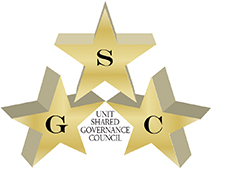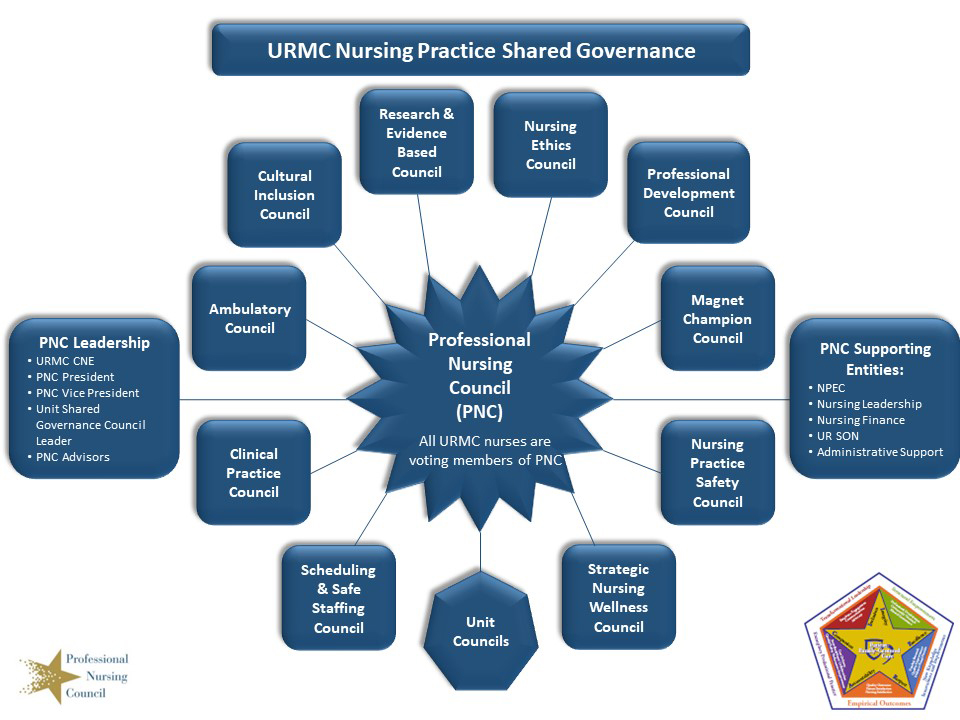Shared Governance
The Professional Nursing Council (PNC) is nursing practice’s Shared Governance Model at Strong. PNC is the avenue for decision making and change throughout nursing. Staff representatives from each nursing unit meet once a month to discuss important topics such as professional development, safety, research, finances, patient and nurse satisfaction, and much more! We continue to strive to report all of the information to nursing practice, and to each nursing unit.
The PNC has celebrated many successes:
- Developing and instituting the Professional Portfolio and enhancements to the performance appraisal process
- Increasing knowledge of the financial costs of nurse orientation, supply and other healthcare related costs
- Increased involvement in community activities
- Improvement in care of the patient with central lines
- Raising money to send a nurse to Honduras through the Shoulder to Shoulder Brigade
- Instituting a new Nurses’ Week award for pioneering in nursing
- Celebrating Nursing Certification and increasing the number of certified nurses at SMH
Thank you,
Ashley-Marie DiVincenzo, BSN, RN
Chair, Professional Nursing Council
Rebecca Johnson, BSN RN, CCRN, PCCN
Vice Chair, Professional Nursing Council
URMC's 5th Magnet Designation Exemplar 2024
Dr. Karen Keady, CNO, URMC SMH is committed to shared governance across the organization, from ancillary to physicians with nurses role modeling the way. Dr. Keady believed recovery and the way through the pandemic was with inclusive shared governance. In May of 2021, she committed to revitalize, enhance, and empower the Professional Nursing Council (PNC) structure with a professional governance budget. Unit councils had dwindled because they lacked time. All were focused on supporting patient care needs. Dr. Keady refused to allow professional governance to be diminished. She leaned into URMC's Goal 5 of the organization's strategic plan "Generate financial resources to thrive and enable support of URMC and UR strategic plans," and took action to develop a professional governance budget, inclusive of organization wide participation. She justified the value of shared decision-making. Paid and protected time was essential components of promoting shared governance engagement. Dr. Keady successfully advocated for paid and protected time for the PNC President, Vice[1] President, and Shared Governance Leader (newly innovated) to a total of 1.6 FTEs. In addition, other key council positions such as the co-chairs and unit representatives received 4 hours of dedicated time per pay period. The total cost for one year of appropriately resourcing the PNC was $379,331 annually. The resources provided the time and dedicated roles for nurses and interprofessional colleagues to fully participate in the PNC, which was essential to decision-making throughout the organization. Dr. Keady's vision, leadership, and advocacy for the organizational investment in a shared governance infrastructure during one of the most challenging times in healthcare history is exemplary.
Exemplar written and submitted by the ANCC Magnet Appraiser Team from their January 2024 site visit. They were to provide supporting evidence showcasing the CNO’s leadership that led to a strategic organizational change.
Every Nurse at Strong is Part of the Professional Nursing Council


Nursing at Strong Memorial Hospital has a long history working in a shared governance environment. This approach creates a work setting in which nurses participate in the planning and decisions that affect their practice. At SMH, this is accomplished through the Professional Nursing Council (PNC) at the hospital level and threads to Unit Councils in each clinical practice area.
Professional Nursing Council Bylaws
The Structure of the Professional Nursing Council
The Professional Nursing Council is chaired and managed by staff nurses who work closely with the Chief Nursing Officer (CNO) to address areas important to nurses. To accomplish the goals of this group the PNC is sub-divided into nine working councils, each chaired by a staff nurse with an advance practice nurse (APN) co-chair.

The purpose of each of the PNC Sub-councils:
To increase knowledge, sensitivity, and awareness of gender, generational, and cultural differences throughout the University; to develop ea deeper understanding and respect of different cultural characteristics, belief systems, history, behaviors, and values of members of other ethnic groups than our own.
To provide nurses with knowledge and understanding of the nursing budget and nursing's role in the overall financial performance of Strong Memorial Hospital.
To evaluate requests made by nursing practice staff to optimize the electronic medical record, eRecord, in order to assure that it accurately reflects and records the care provided.
To exemplify, promote and enhance the five tenets of Magnet: Transformational Leadership, Structural Empowerment, Exemplary Professional practice, New Knowledge, Innovations and Improvements and Empirical Outcomes. Through education, collaboration and encouragement, Magnet Champions will empower UR Medicine Nursing Staff with Magnet pride (spirit), Magnet Ownership and Magnet accountability.
The Professional Development Council is responsible for the professional development of nursing and nursing recognition through education, certification and celebration of nursing excellence. The Professional Development Council provides a framework to support professional growth.